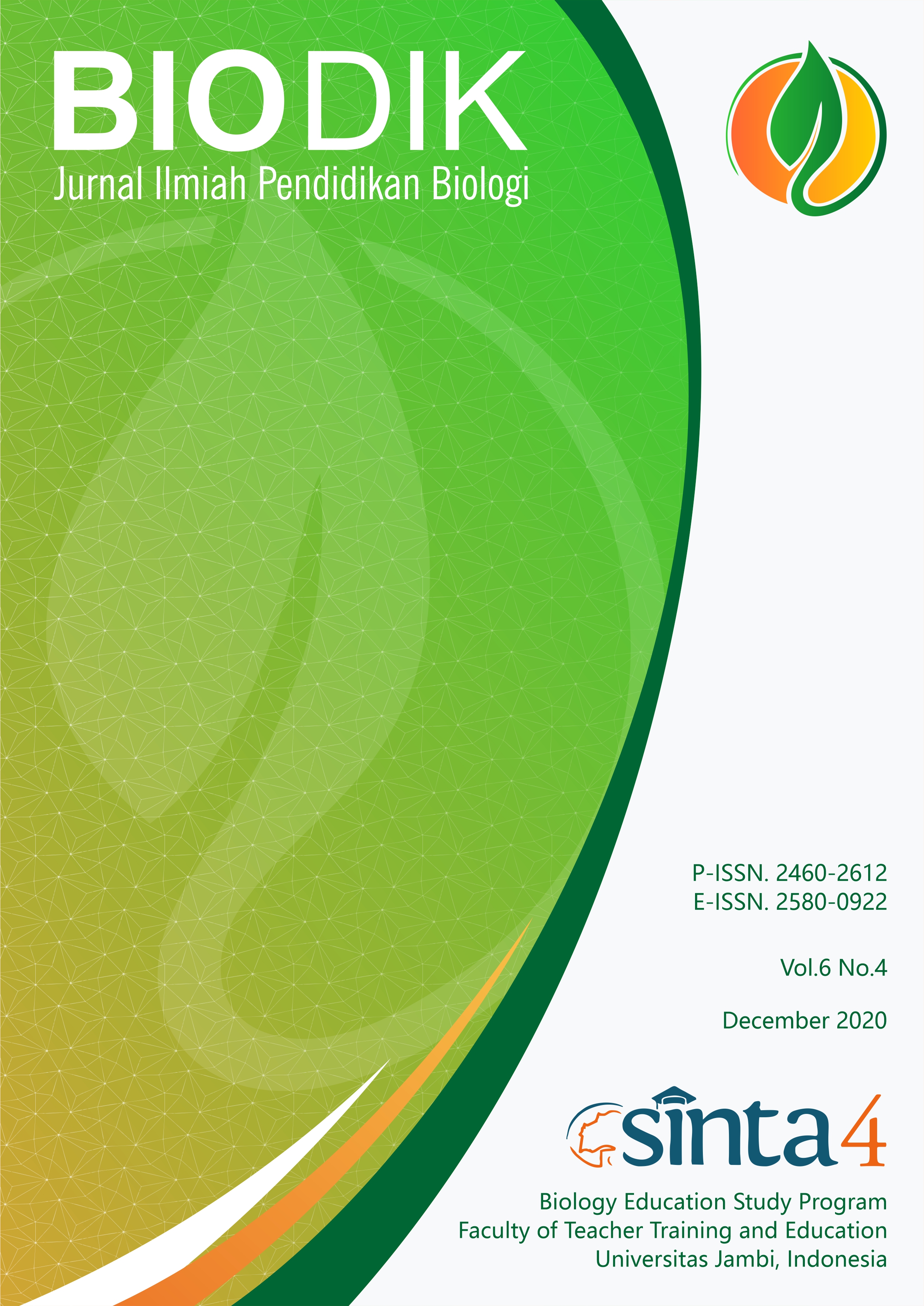Analisis Konseptual, Praktikal, Konstruksi Pengetahuan dan Rekonstruksi Lembar Kerja Praktikum Enzim Katalase
(Conceptual Analysis, Practical, Knowledge Construction and Reconstruction of Catalase Enzyme Worksheets)
DOI:
https://doi.org/10.22437/bio.v6i4.9548Abstract
This study aims to analyze the effectiveness (Practicum Worksheet) of the catalase enzyme that has been used in high schools and provide solutions to solve these problems in the form of LKS reconstruction. The method used is descriptive qualitative analysis. Samples were taken from the Biology class XII book published in 2006-2015 using total sampling. The instrument used was the LKS analysis instrument (conceptual, practical and knowledge construction analysis) to determine the relevance of practicum activities with the curriculum and rubrics based on the Vee Diagram. The results of the analysis using the LKS analysis instrument found the following problems: (1) cognitive problems: 70% of the objectives of the LKS were not in accordance with the work steps; and 60% of LKS competencies are not in accordance with KD; (2) practical problems; 100% LKS do not include time allocation; 90% of LKS did not include safety lab procedures and 60% of LKS did not have appropriate work steps (3) knowledge construction problems: 100% of LKS did not contain questions regarding the character of the facts that emerged; and 70% of worksheets did not contain questions of data analysis and interpretation. Whereas in the results of the analysis using the Vee Diagram, there were no LKS that reached the maximum total score of the Vee Diagram rubric (score 18). The conclusion from the analysis can be seen that the worksheets already have conceptual, practical and knowledge construction components but have not obtained the maximum score from the Vee diagram. So that it is necessary to reconstruct the catalase enzyme lab worksheet.
Abstrak. Penelitian ini bertujuan untuk menganalisis efektivitas (Lembar Kerja Praktikum) Enzim Katalase yang selama ini digunakan di SMA dan memberikan solusi pemecahan masalah tersebut dalam bentuk rekonstruksi LKS. Metode yang digunakan adalah analisis deskriptif kualitatif dengan sampel 10 LKS mengenai praktikum enzim katalase pada kurikulum 2013 dan KTSP . Sampel diambil dari buku Biologi kelas XII yang diterbitkan pada tahun 2006-2015 dengan menggunakan cara total sampling. Instrumen yang digunakan adalah instrumen analisis LKS (analisis konseptual, praktikal dan konstruksi pengetahuan) untuk mengetahui relevansi kegiatan praktikum dengan kurikulum dan rubrik berdasarkan Diagram Vee (Novak dan Gowin, 2006). Hasil analisis menggunakan instrumen analisis LKSÂ ditemukan masalah sebagai berikut: (1) masalah kognitif: Hasil analisis menggunakan instrumen analisis LKS ditemukan masalah yang paling mendominasi diantaranya:Â (1) masalah kognitif : 70% tujuan LKS tidak sesuai dengan langkah kerja; dan 50% kompetensi LKS tidak sesuai dengan KD ; (2) masalah praktikal; 100% LKS tidak mencantumkan alokasi waktu; 90% LKS tidak mencantumkan prosedur safety lab dan 70% LKS tidak memiliki langkah kerja yang tepat (3) masalah konstruksi pengetahuan: 100% LKS tidak memuat pertanyaan mengenai karakter fakta yang muncul; dan 70% LKS tidak memuat interpretasi data pada tabel hasil pengamatan. Sedangkan pada hasil analisis dengan menggunakan Diagram Vee ditemukan tidak ada satu pun LKS yang mencapai skor maksimal dari rubrik Diagram Vee (skor 18). Simpulan dari analisis dapat diketahui bahwa LKS sudah memiliki komponen konseptual, praktikal dan konstruksi pengetahuan namun belum memperoleh skor maksimal dari Diagram Vee. Sehingga perlu adanya rekonstruksi LKS praktikum enzim katalase
Downloads
Downloads
Published
Versions
- 2020-12-18 (2)
- 2020-12-18 (1)
How to Cite
Issue
Section
License
Copyright (c) 2020 Rinna Lestari, Bambang Supriatno, Sri Anggraeni

This work is licensed under a Creative Commons Attribution-NonCommercial-ShareAlike 4.0 International License.
Copyright Notice
Authors who publish with Biodik : Jurnal Ilmiah Pendidikan Biologi agree to the following terms:
- For all articles published in Biodik : Jurnal Ilmiah Pendidikan Biologi, copyright is retained by the authors and grant the journal right of first publication with the work simultaneously licensed under a Creative Commons Attribution-ShareAlike 4.0 International Licensethat allows others to share the work with an acknowledgment of the work's authorship and initial publication in this journal.
- Authors are able to enter into separate, additional contractual arrangements for the non-exclusive distribution of the journal's published version of the work (e.g., post it to an institutional repository or publish it in a book), with an acknowledgment of its initial publication in this journal.
- Authors are permitted and encouraged to post their work online (e.g., in institutional repositories or on their website) prior to and during the submission process, as it can lead to productive exchanges, as well as earlier and greater citation of published work (See The Effect of Open Access).
















